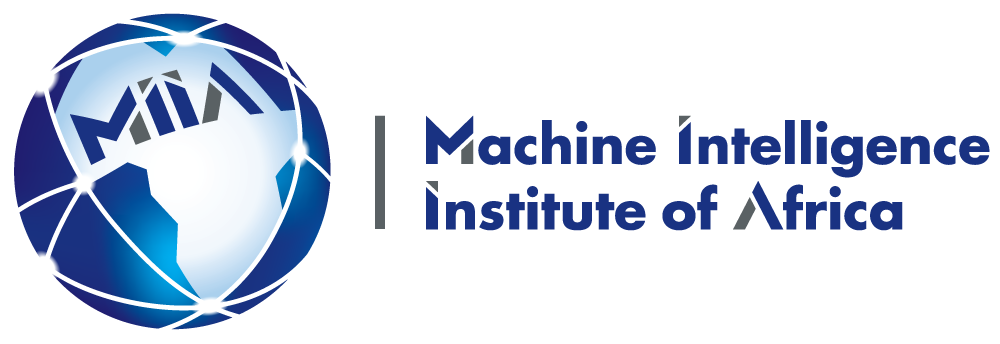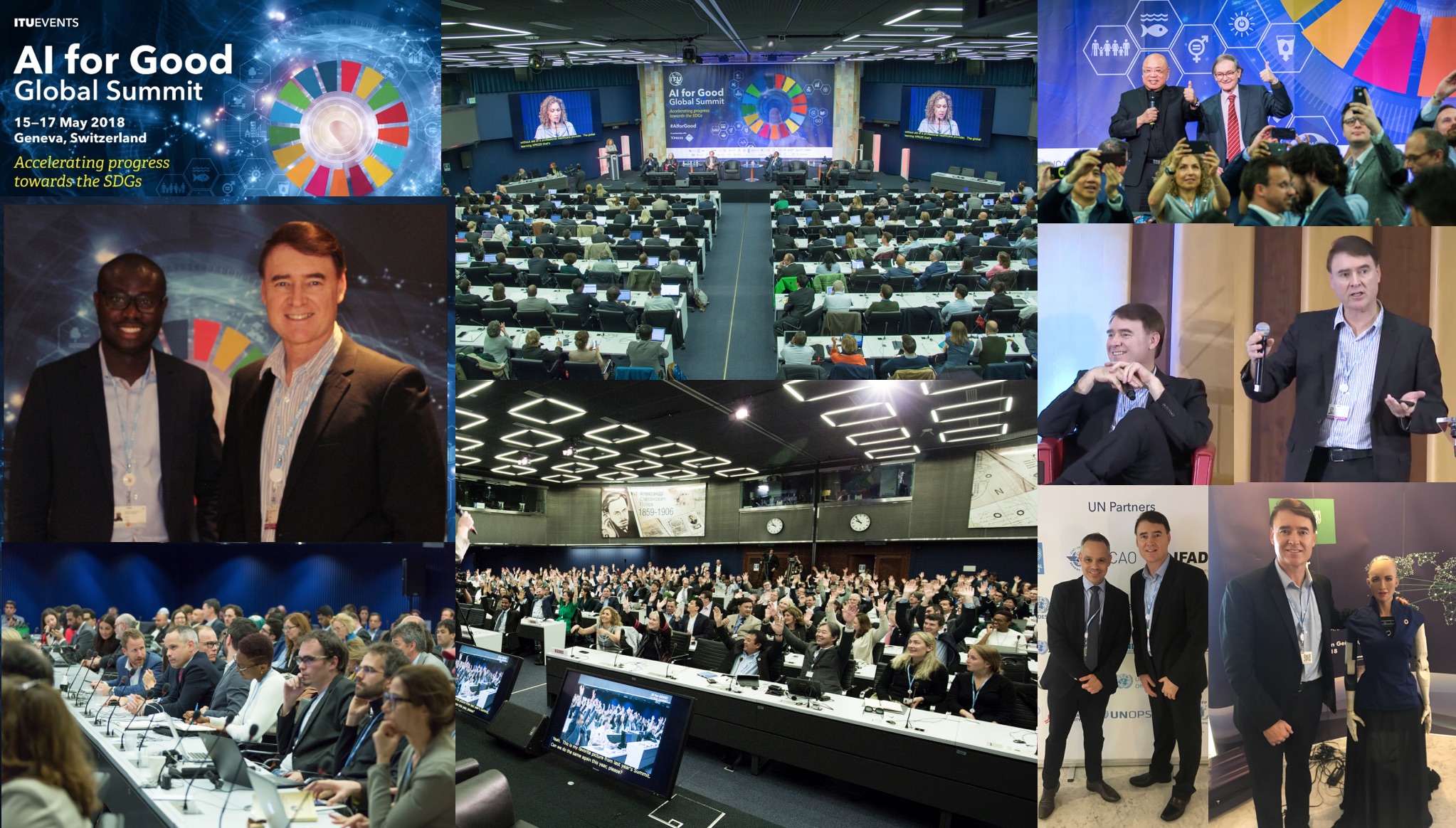
AI for Good – African Perspective
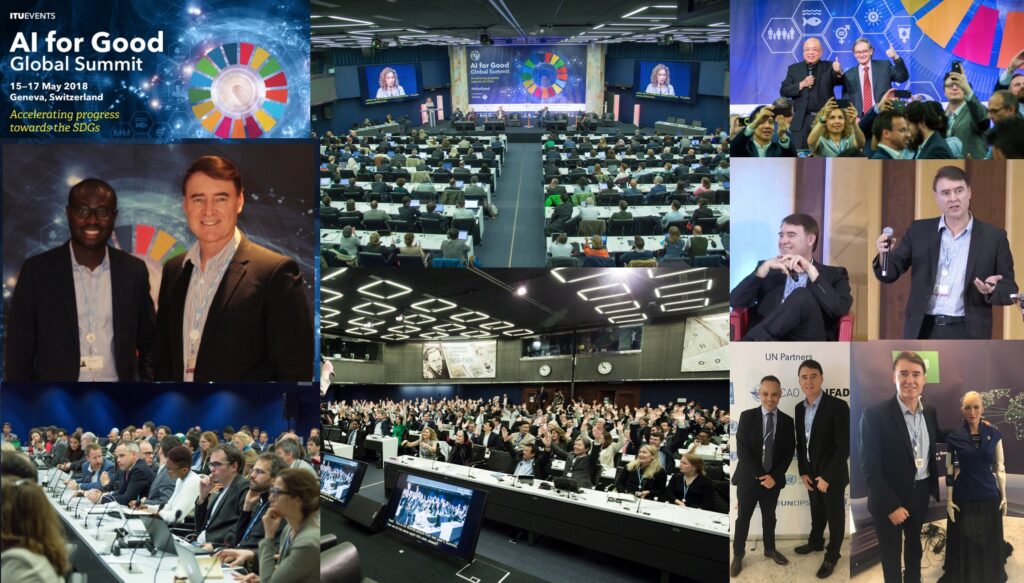
As I’m passionate about shaping a better future in the Smart Technology and specifically to help transform Africa through Artificial Intelligence (AI), Big Data & Analytics, Internet of Things (IoT), and Blockchain technologies, it was a privilege to participate as invited AI expert at the AI for Good Global Summit in Geneva, Switzerland on 15-17 May 2018 as well as the AI: Current Policy Reflections and Future Strategies on 18 May 2018 at the United Nations. As mentioned here as well as this post, this was also an opportunity to represent the Machine Intelligence Institute of Africa (MIIA), Cortex Logic (as one of the sponsors) and the African perspective on the use of these technologies with respect to the United Nations’ Sustainable Development Goals. In this post I would like to share some links, feedback, perspectives and outcomes of the AI for Good Global Summit. I also share my presentation on Health, Water, Smart Education & Smart Technology Services for African Smart Cities. In a separate post, I’ll do the same for the AI: Current Policy Reflections and Future Strategies conference.
The AI for Good Global Summit is organized by ITU in partnership with XPRIZE Foundation, the global leader in incentivized prize competitions, the Association for Computing Machinery (ACM) and sister United Nations agencies including UNESCO, UNICEF,UNCTAD, UNIDO, Global Pulse, UNICRI, UNODA, UNIDIR, UNODC, WFP, IFAD, UNAIDS, WIPO, ILO, UNITAR, UNOPS, OHCHR, UN University, WHO, UNEP, ICAO, UNDP, The World Bank, UN DESA, CTBTO, UNISDR, and UNOG.
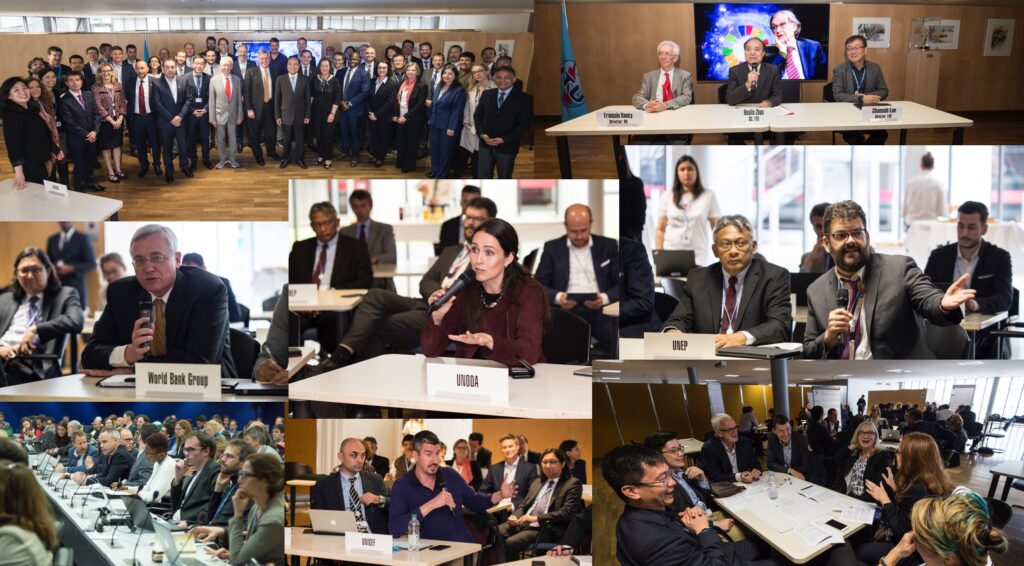
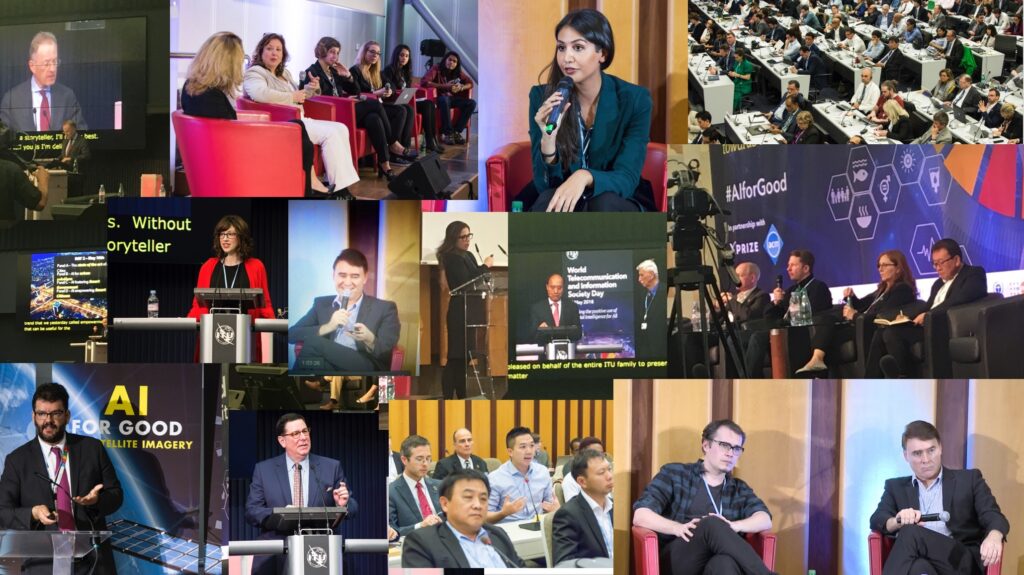
The home page for the AI for Good Global Summit 2018 provides links to:
- AI for Good Programme and presentations
- AI for Good Video Highlights 1-3 days:
- AI for Good Web Archives (videos of each session)
- AI for Good Global Summit – Transcripts
- Ai for Good YouTube playlist
- AI for Good Event Photos
- Meet the AI for Good Experts
- AI for Good LinkedIn Group
- AI Repository
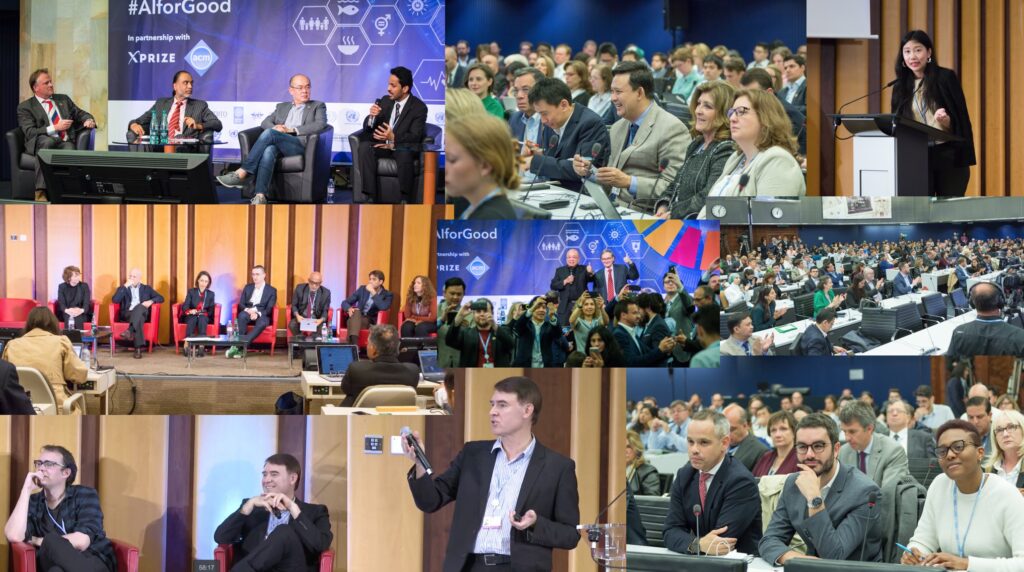
AI Empowering Smart Citizens
- Dr Jacques Ludik, Founder & CEO, Cortex Logic; Founder & President, Machine Intelligence Institute of Africa “Health, Water, Smart Education & Smart Technology Services for African Smart Cities”
- Video: Web Archives:
- For AI Empowering Smart Citizens session, click “Floor”
- 2018-05-16 16:00(UTC +1) AI Empowering Smart Citizens (Room C2) [ Floor ]
- Video: Web Archives:
- Dr Joaquin Rodriguez Alvarez, Prof and researcher EPSI-UAB, Leading Cities Coordinator [Presentation]
- Video: Web Archives:
- For AI Empowering Smart Citizens session, click “Floor”
- 2018-05-16 16:00(UTC +1) AI Empowering Smart Citizens (Room C2) [ Floor ]
- Video: Web Archives:
Wrap-up:
- Alexandre Cadain, Co-Founder & CEO at ANIMA; XPRIZE Ambassador
- Renato de Castro, SmartCity Expert
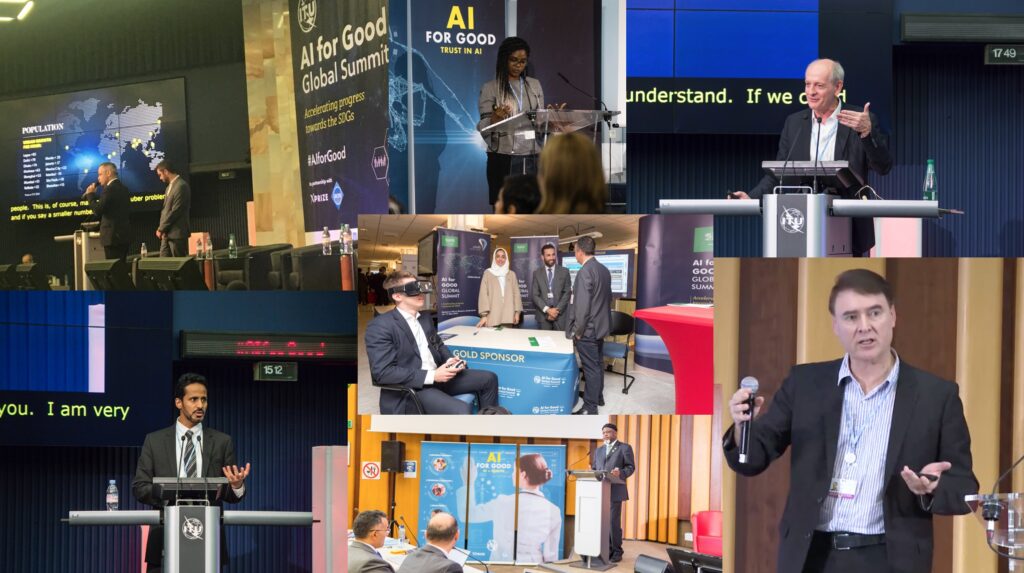
PIONEERING AI-DRIVEN PROJECT PROPOSALS GENERATED AT THE SUMMIT:
Monitoring agriculture and biodiversity using satellite imagery
Three project proposals use AI-powered satellite imagery analysis to predict and prevent deforestation, track livestock with great accuracy, and provide data analytics for micro-insurance to small-hold farmers. A fourth project proposal provides enabling infrastructure and common capabilities – through a ‘global service platform’ – to support new satellite data projects in achieving immediate scale.
AI-improved healthcare
Fifteen project proposals aim to improve and expand healthcare in fields spanning primary care and service delivery, the detection of impending vision loss and osteoarthritis, the integration and analysis of medical data, the consideration afforded to AI by healthcare policy, and responses to outbreaks of disease and other medical emergencies.
Participants also discussed the creation of a new study platform that would be open to all interested stakeholders, and supported by ITU and the World Health Organization. This would collect use cases of AI in healthcare and identify the data formats and interoperability mechanisms required to amplify the impact of such use cases.
Smart urban development
Seven project proposals aim to support linguistic diversity within cities, combat gender violence, and provide virtual testbeds for the simulation of smart city projects. These projects included the targeted establishment of an ‘Internet of Cities’, a global network able to share the data, knowledge and expertise required to replicate successful smart city projects elsewhere in the world.
Trust in AI
Nine project proposals address three key dimensions of trust in AI: AI stakeholders’ trust in AI developers; trust across national, cultural and organizational boundaries; and trust in AI systems themselves.
Other projects proposals seek to build trust in AI’s contribution to agriculture and mental health. They investigate strategies for developing countries to maintain social stability as AI-driven automation influences labour markets. They also explore how the concept of trust varies across cultures, and they study how policymakers could encourage the development of trustworthy AI systems and datasets free of bias.
These projects would be supported by a proposed incubator for multidisciplinary collaboration in the interest of building trust in AI, trustfactory.ai.
EXHIBITS / DEMOS
https://www.itu.int/en/ITU-T/AI/2018/Pages/demos.aspx
Day 1, 15 May 2018
- Sophia – First Robot Citizen
- Tilde – Neural Machine Translation
- ETRI – Smart English Learning System
- Comobilis – helping citizens get organised to share a common vehicle
- iCub – EU open source Robot
Day 2, 16 May 2018
- Zero Abuse Project – AI solution to track child abuse
- AiFRED
- MedMind
- Ubenwa
- Amiko
- Deloitte – Alice (Intelligent Care Robot) + preventing financial crime project
Day 3, 17 May 2018
- Sage Foundation – AI powered domestic violence assistance bot
- MIT – Probabilistic programming for Data Science
- Atom360
- Global AI
- Kiwi – Autonomous delivery robot
Sophia and Hanson Robotics
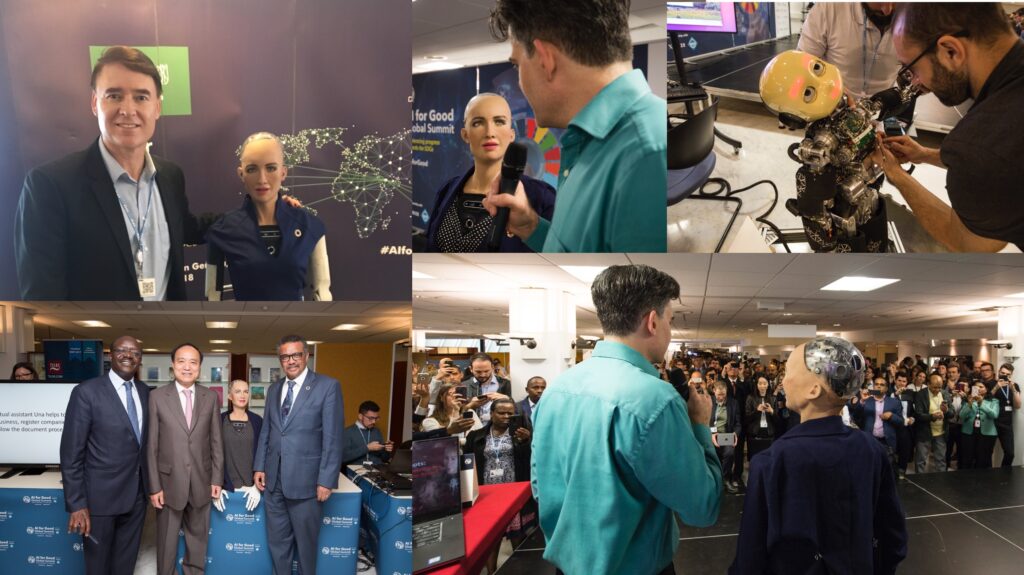
CELEBRATION OF THE WORLD TELECOMMUNICATION & INFORMATION SOCIETY DAY
AI-Powered Moonshots – Meet the Astronauts
- Liu Yang, Astronaut and Pilot; first Chinese woman in space [Presentation]
- Samantha Cristoforetti, Astronaut and Pilot; first Italian woman in space [Presentation]
- Anousheh Ansari, Member & Chair of Management, XPRIZE Foundation Board of Directors, Space Ambassador; first female private space explorer [Presentation]
- ITU Journal ICT Discoveries: “The impact of Artificial Intelligence on communication networks and services” (Issue No.1)[Presentation]
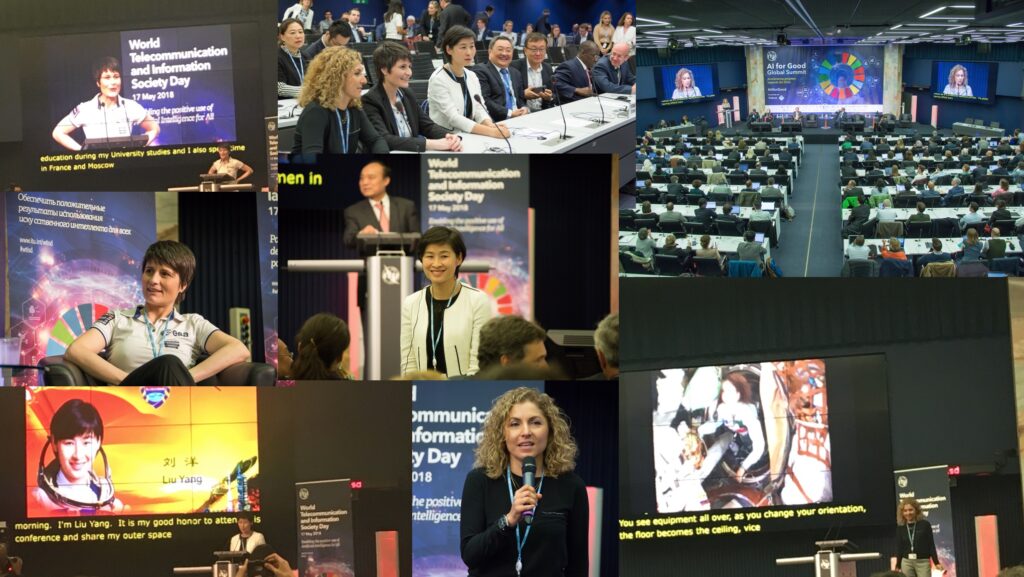
Visit to the United Nations and Palais de Nations
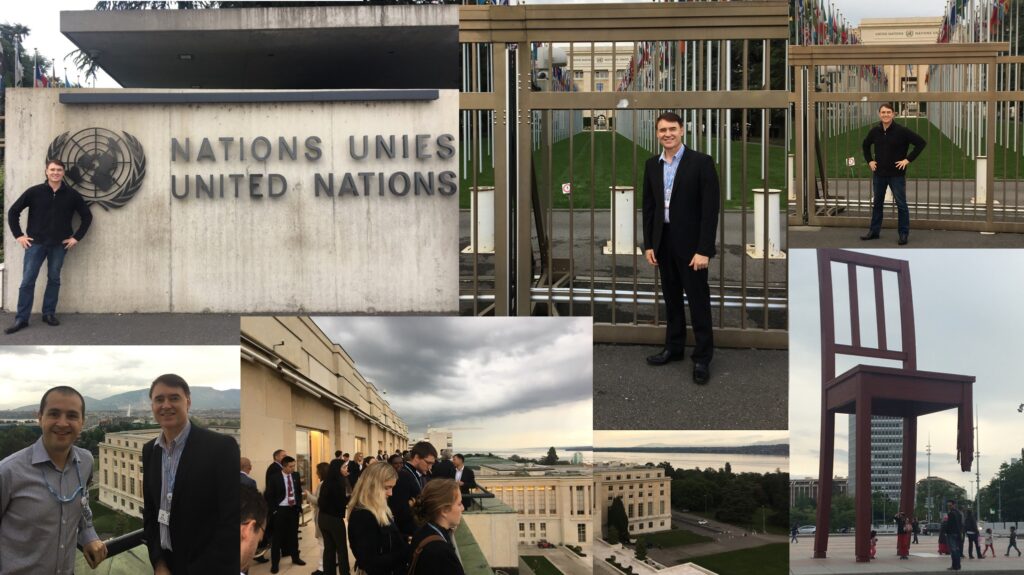
Health, Water, Smart Education & Smart Technology Services for African Smart Cities
- AI Community & Data Platform for Africa
- Collaboration betweem the Machine Intelligence Institute of Africa (MIIA) and Zindi
- Health Data & Analytics Ecosystem for Africa
- Water Data & Analytics Platform for Africa
- Smart Education for Africa
- Smart Technology Services for African Smart Cities
- Empowering Smart Citizens
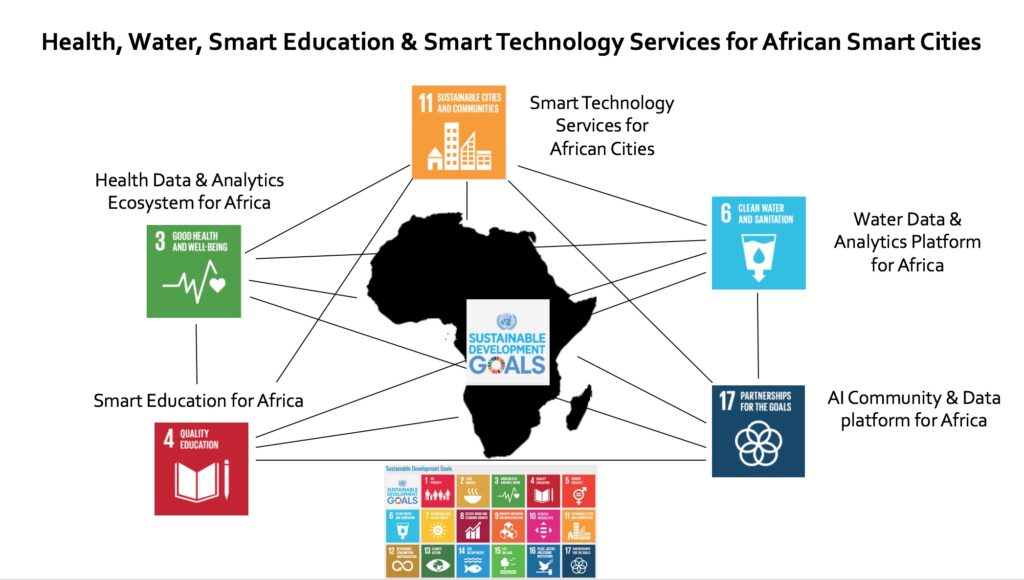
Mapping of Sustainable Development Goals to some of the African Smart Technology Projects
- Partnerships for the Goals (17)
- AI Community and Data Platform for Africa
- Good Health and Well-Being (3)
- Health Data & Analytics Platform & Ecosystem for Africa
- Sustainable Cities and Communities (11)
- Smart Technology Services for African Cities
- Clean Water and Sanitation (6)
- Water Data & Analytics Platform for Africa
- Quality Education (4)
- Smart Education for Africa
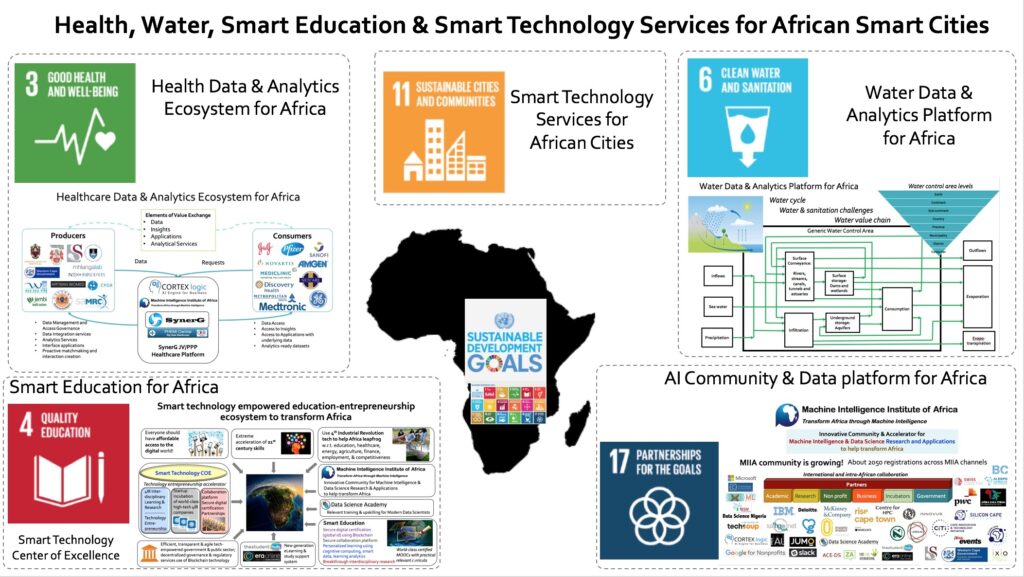
Mapping of AI for Good Summit Tracks to African Smart Technology Projects
| AI for Good Global Summit Track | Example Use cases | Mapping to Africa Project: Health, Water, Smart Education & Smart Technology Services for African Smart Cities | |
| AI and satellite imagery | show potential of AI to map poverty and aid with natural disasters using satellite imagery | AI Community & Data Platform for Africa | Smart Technology Services for African Smart Cities |
| AI and health | new opportunities for AI to help achieve Universal Health Coverage | Health Data & Analytics Ecosystem for Africa | AI Community & Data Platform for Africa; Smart Technology Services for African Smart Cities |
| AI and smart cities & communities | how AI could assist the delivery of citizen-centric services in smart cities | AI Community & Data Platform for Africa; Smart Technology Services for African Smart Cities | Water Data & Analytics Platform for Africa |
| Trust in AI | help achieve transparency and explainability in AI algorithms | AI Community & Data Platform for Africa | Smart Technology Services for African Smart Cities |
AI Community & Data Platform for Africa
- Machine Intelligence Institute of Africa (MIIA)
- The Machine Intelligence Institute of Africa (MIIA) is a non-profit organization with a vision to be an innovative community and accelerator for machine intelligence and data science research and applications to help transform Africa. MIIA wants to build a strong and innovative machine intelligence and data science community to help transform Africa by networking together the critical mass of resources, promote and sponsor learning activities and strengthen scientific and technological excellence, mentoring and collaboration on the continent. MIIA wants to accelerate and deliver breakthrough machine intelligences and data science research and practical applications to solve African problems, support entrepreneurial activity, help drive long-term inclusive and sustainable scientific, technological and socio-economic development on the continent. MIIA looks to partner with governments, business, start-up incubators, non-profit organisations, universities and research organisations to support and help mould the future of machine intelligence and data science research and applications in Africa.
- Events:
- Communication Platform:
- Projects:
- Resources:
- Jobs
- Partners:
- The Machine Intelligence Institute of Africa (MIIA) is a non-profit organization with a vision to be an innovative community and accelerator for machine intelligence and data science research and applications to help transform Africa. MIIA wants to build a strong and innovative machine intelligence and data science community to help transform Africa by networking together the critical mass of resources, promote and sponsor learning activities and strengthen scientific and technological excellence, mentoring and collaboration on the continent. MIIA wants to accelerate and deliver breakthrough machine intelligences and data science research and practical applications to solve African problems, support entrepreneurial activity, help drive long-term inclusive and sustainable scientific, technological and socio-economic development on the continent. MIIA looks to partner with governments, business, start-up incubators, non-profit organisations, universities and research organisations to support and help mould the future of machine intelligence and data science research and applications in Africa.
- ZINDI
- ZINDI is a social enterprise whose mission is to build the data science capacity in Africa. Zindi’s vision is for a vibrant community of data scientists across Africa to be mobilized, solving the region’s most pressing problems. ZINDI is an online platform that will host competitions, datasets, tutorials, jobs board, and discussion forums. ZINDI will work with companies to develop, curate, and prepare data-driven challenges. Solutions are ranked automatically by prediction accuracy. The ZINDI platform offers data scientists the opportunity to access jobs and cash prizes, to build their profile and skills, and to connect with their peers throughout the region. ZINDI enables companies, organizations, and governments to host competitions to solve their specific problems and attract the best data science talent in Africa
- MIIA and ZINDI are collaborating around creating a capability on the African continent for transforming Africa through data science and machine intelligence and helping governments, businesses, non-profit organizations, and communities thrive in the Smart technology era. Where MIIA has been successful at creating a community of data scientists, machine intelligence experts, and data enthusiasts around the continent, providing a communications platform, organising and hosting events, conferences, and hackathons, facilitation of sustainable development projects, providing Machine Intelligence and Africa related resources, and coordinating groups of data scientists around the continent, ZINDI aims to create a platform where organizations can post problems to solve, host data relevant to Africa, offer data scientists access to tutorials and other resources, and offer the community a platform for bringing together in the supply and demand for data science skills. The organisations recognise that these activities are complimentary to a large extent and commit to work together within their own areas of focus and expertise and to jointly raise funding to help Africa thrive in the smart technology era.
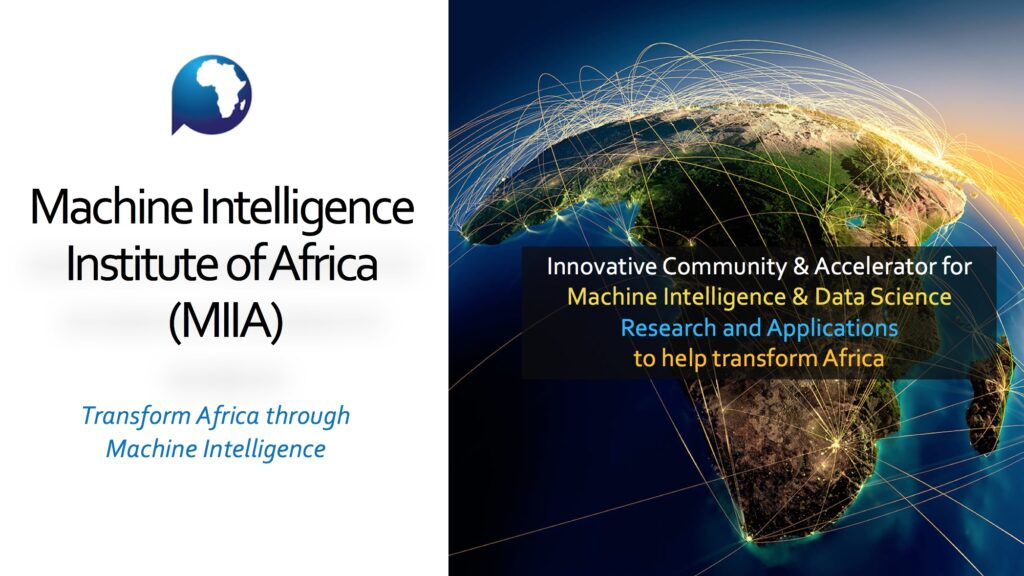
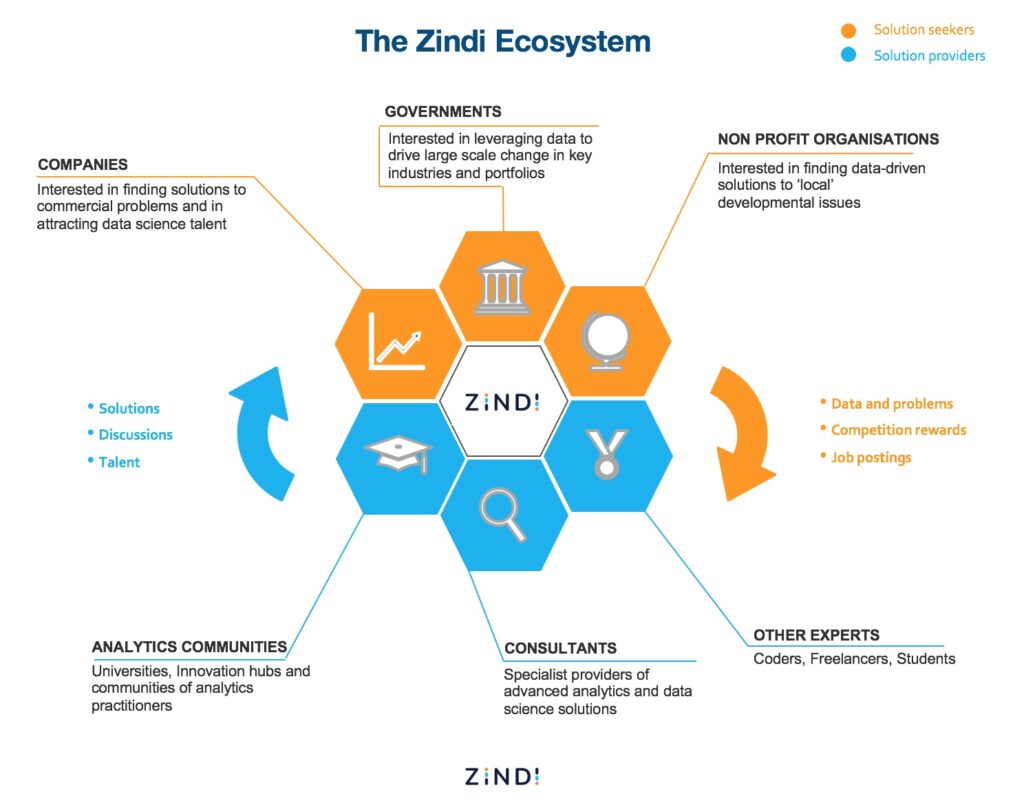
Smart Cities
Smart cities are a constant flow. However, we have learnt that data gathering is not the main problem, rather its digestion is the challenge. While technology is crucial, it has a use-it-or-lose-it dimension and requires well-spread digital and analytics skills among the agents delivering the change. We need indeed fully prepared and properly trained professionals to ensure that the information is efficiently managed, because the large volumes of data have to be converted into effective and efficient public policies. Furthermore, data privacy and data transparency are a must to ensure both innovations and the proper utilization of the projects being deployed. Data privacy will establish trust, and data transparency will give rise to government control and accountability. The final stage of this concept actively seeks to engage citizens to work in collaboration with private corporations and the public sector to build better cities in which to live. Citizens are not only expected to increase their use of applications to contribute to the decision-making process, but also to be part of the development of such innovative gadgets. Although citizens are already becoming increasingly aware of all the potentials of living in a smart world, they should be fully integrated in the dyanmics which are already in place between private and public sectors. If the aim is to design tailored solutions for day-to-day problems, and to work for a sustainable city life unhindered by the scarcity of resources, all members of society needs to work collaboratively. Smart cities shall be therefore inherently linked to the efforts of citizens, businesses and governments, and their interconnections through devices, sensors and applications.
Empowering Smart Citizens
Eighty percent of the population currently lives in cities. Population growth and aging, climate change and pollution – all of these are defacto trending topics in our current societies and all of them contribute to the pressure on public resources availability. Faced with the challenge of maintaining citizens’ quality of life and living, the smarter move for governments is optimize the delivery of services via the use the increasing availability of data, Artificial Intelligence, Big Data & Analytics, Internet of Things, and Blockchain technologies. The goal of Smart Cities is to tailor public services to increase resource efficiency.
According to Waag Society in Amsterdam, Smart Citizens have the following characteristics:
- Will take responsibility for the place they live, work and love in
- Value access over ownership, contribution over power
- Will ask forgiveness, not permission
- Know where they can get the tools, knowledge and support
- Value empathy, dialogue and trust
- Appropriate technology, rather than accept it as is
- Will help the people that struggle with smart stuff
- Ask questions, before they come up with answers
- Take part in design efforts to come up with better solutions
- Work agile, prototype early, test quickly, start all over
- Will not stop in the face of huge barriers
- Continously share their knowledge and learning
Empowering Smart Citizens:
- Bottom up decision making vs Top down decision making
- Non-linear approach vs Linear approach
- Encouring complexity vs Reducing complexity
- Embracing uncertainty vs Minimizing uncertainty
- Enable & boost creativity vs Stifling innovation
Start the journey to use AI to enhance citizen exerience:
- Put humans at the center
- Start with a design that is ethical, compliant, and responsible and that centers around people: citizens/customers and workers
- Develop and enterprise AI strategy
- Develop an enterprise AI strategy that defines your long-term vision, roadmap, and governance while delivering near-term value
- Make user journeys and prioritize
- User service design to map user journeys into service blueprints that can help identify and priotize AI opportunities
- Keep goals in sight
- Implement targted solutions to help achieve your goals through intelligent automation, superior judgement, and enhanced interaction.
- Never stop improving
- Keep assessing strengths and weaknesses and continually address what your learn
Smart Technology Services for African Smart Cities
Healthier Cities – Health & Social Services
- Population Health Management
- Remote Patient Monitoring
- Social Programs
- Virtual Health
Educated Cities – Education
- Classroom Devices for Learning
- Facilities Management
- Future-Ready Skills
- Learning Management Systems
- Physical Safety
- Predictive Analytics for Education
Safer Cities – Public Safety and Justice
- Call Center & Dispatch
- Catastrope Modeling
- Community Policing
- Courts Management
- Digital Patrol
- Operational Intelligence
- Prison Management
- Video Management
Sustainable Cities – Urban Mobility
- Connected Vechicle Analytics
- Disruption Management
- Fare & Toll Management
- Fleet & Asset Management
- Parking Management
- Trafic & Transit Optimization
Sustainable Cities – Energy & Water
- Atmospheric Air Quality Management
- Carbon Management
- Energy Distribution Management
- Water & Sewer
Sustainable Cities – Buildings, Infrastructure, Planning
- Land Management
- Sanitation
- Smart Buildings
- Street Lights
Digital Cities – Government Admin
- Citizen Services
- Connected Field Services
- Decision Management & Support
- Personalization
- Regulations, Licensing & Permitting
- Virtual Town Hall
Digital Cities – Government Finance
- Financial Mangement
- Fradu Detection & Prevention
- Grants Management
- Tax
Digital Cities – Tourism, Recreation, Culture
- Destination Management
- Sports & Events
- Tourism portals
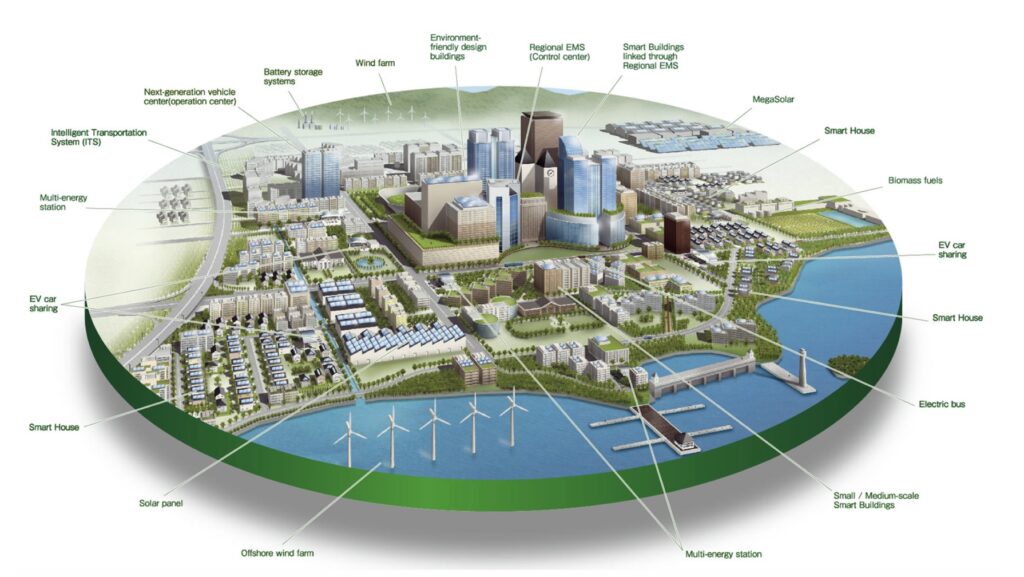
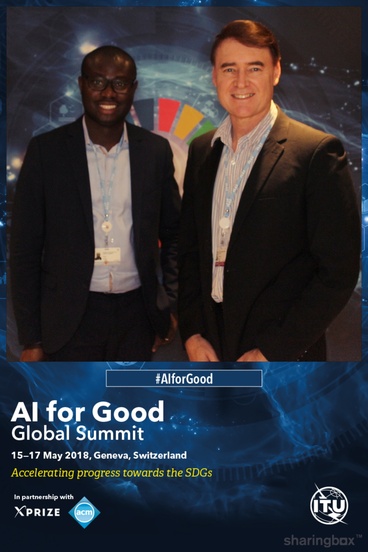
Machine intelligence Institute of Africa (MIIA)

- Website: http://machineintelligenceafrica.org
- Community: http://machineintelligenceafrica.org/members/
- Events: http://machineintelligenceafrica.org/activities/events/
- Projects: http://machineintelligenceafrica.org/activities/projects/
- Partners: http://machineintelligenceafrica.org/partners/
- Blog: http://machineintelligenceafrica.org/blog/
- LinkedIn Articles: https://www.linkedin.com/in/jacques-ludik-0b22861/detail/recent-activity/posts/
- LinkedIn Group: https://www.linkedin.com/company/10095978/
- MIIA YouTube Channel (Playlist): http://www.youtube.com/playlist?list=PLOqigXLyHjNYf8R4WIM7HMVbQpQ03QNu-
- To join the MIIA community on Slack, our real-time community messaging platform, please sign-up here.
Some Recent MIIA posts:
- AI: Policy Reflections & Future Strategies
- AI for Good – African Perspective
- Exciting AI Developments in Africa and Beyond!
- Machine Intelligence Institute of Africa 2018
- Machine Intelligence Institute of Africa – Season’s Greetings!
- Deep Learning in Africa
- Artificial Intelligence in Africa
- How Artificial Intelligence disrupts Industries
- Deep Learning applications, platforms, limitations and quantum computing
- AI in Manufacturing and Data Science/IoT hackathon on Mining data
- Data Science and Machine Intelligence use cases in Africa 2017
- Machine Intelligence Institute of Africa collaboration with Data Science Nigeria
- Solving Intelligence, Solving Real-world Problems
- Artificial Intelligence and Data Science use cases in Africa
- Machine Intelligence Institute of Africa
- Artificial Intelligence in Finance, Education, Healthcare, Manufacturing, Agriculture, and Government
- Artificial Intelligence at the centre of MIIA partner activities with Silicon Cape, Rise Africa, and Insights2Impact
Joining Machine Intelligence Institute of Africa (MIIA)
- Anyone interested to join MIIA and/or participate in using smart technologies to help address African problems such as those in education, finance, healthcare, energy, agriculture and unemployment is welcome to do this here. See How to participate for more details on various ways to help MIIA execute its mission.
- View the current MIIA Community on the MIIA website as well as MIIA communications on Slack, the LinkedIn group, Meetup, Google+, FaceBook, and Twitter.
- MIIA Meetup in Cape Town: https://www.meetup.com/Machine-Intelligence-Institute-of-Africa/
- MIIA Meetup in Johannesburg/Pretoria: https://www.meetup.com/Machine-Intelligence-Institute-of-Africa-Jhb-Pta/
To join the MIIA community on Slack, our real-time community messaging platform, please sign-up here.
- If you have any issues in this regard let us know via info@machineintelligenceafrica.org. As Slack is our primary community chat and messaging vehicle, we highly recommend that you join us on this platform as well.
